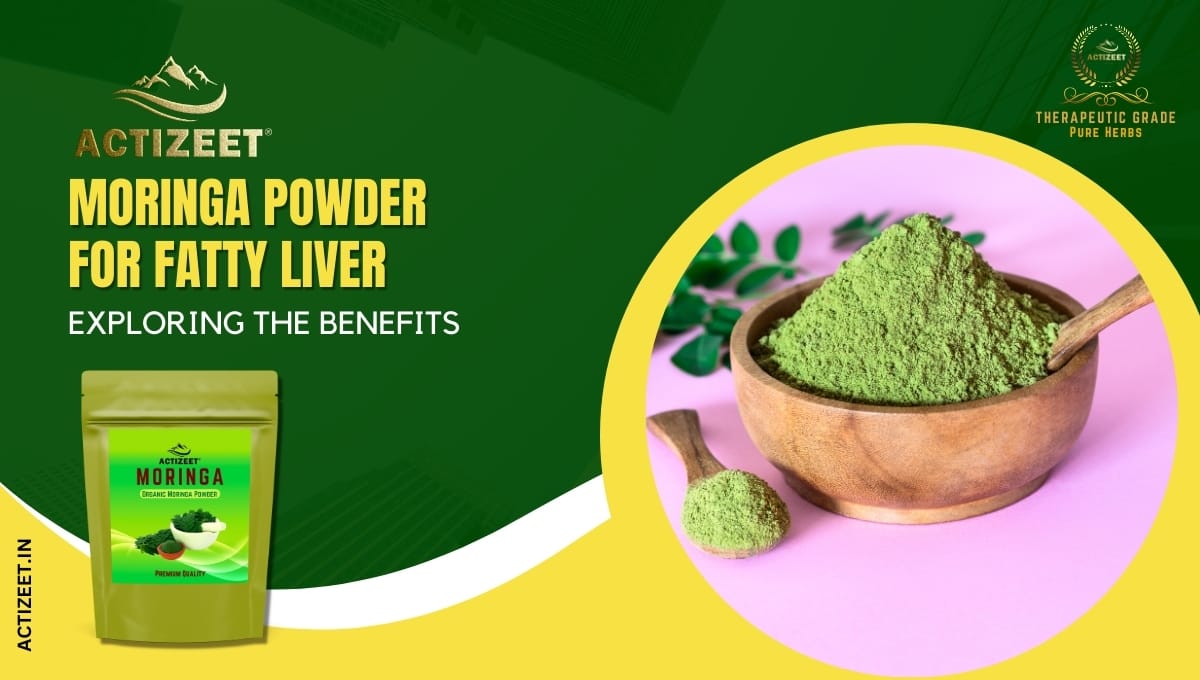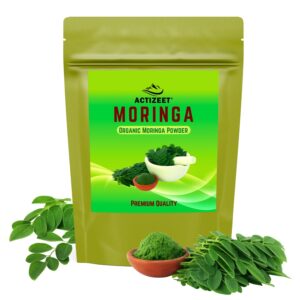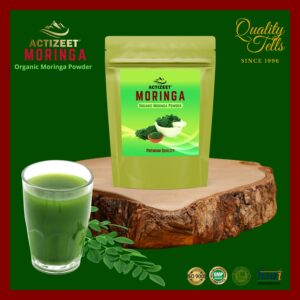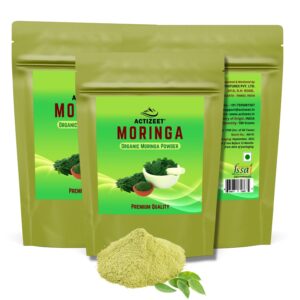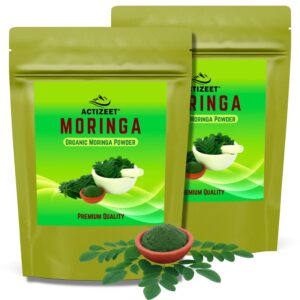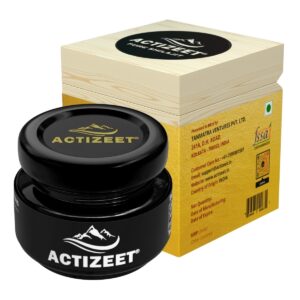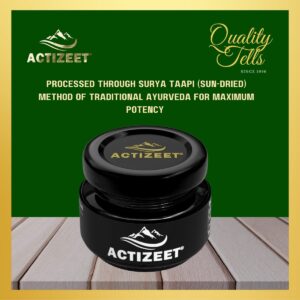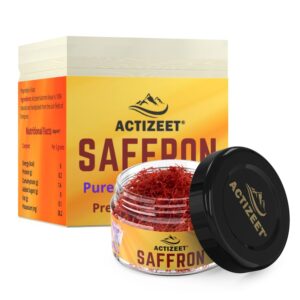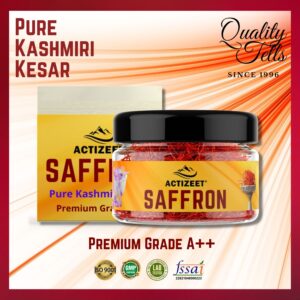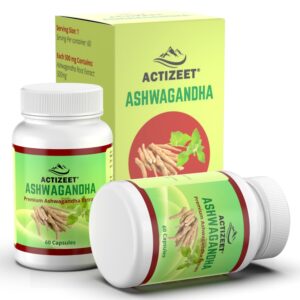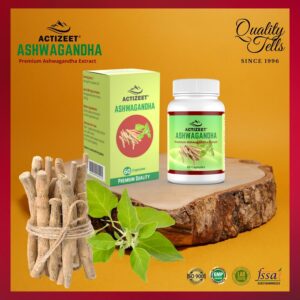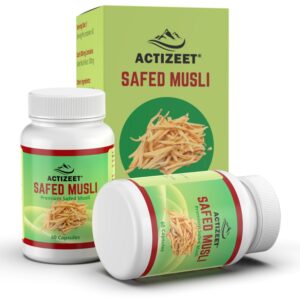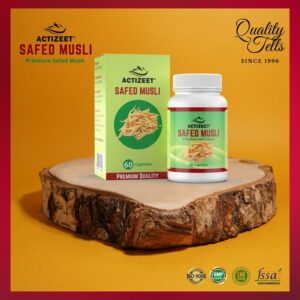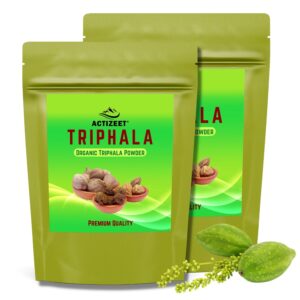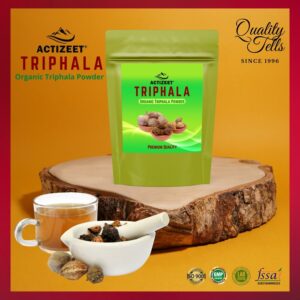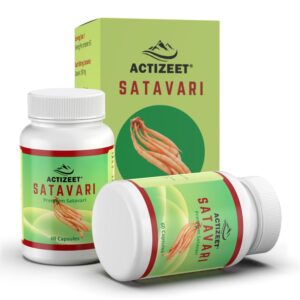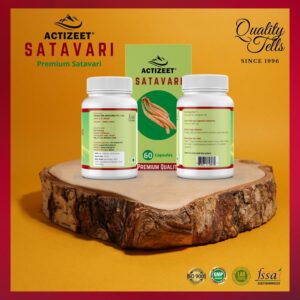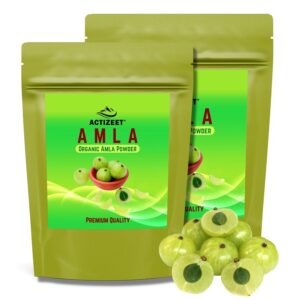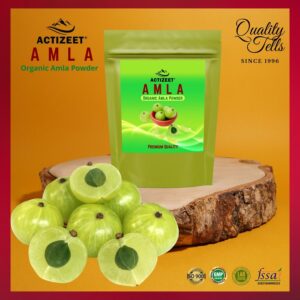Welcome to the world of Moringa oleifera, a miracle tree with an array of astonishing health benefits. Native to the subtropical regions of Asia and Africa, this vibrant green wonder is revered for its exceptional nutritional profile.
Packed with essential vitamins, minerals, and antioxidants, it has garnered attention worldwide for its potential to support overall well-being. The Moringa oleifera tree is often referred to as the “Tree of Life” due to its incredible adaptability and numerous medicinal properties.
Its leaves are particularly cherished for their rich nutrient content, boasting an impressive array of vitamins such as vitamin A, vitamin C, vitamin E, and B vitamins like thiamine (B1), riboflavin (B2), niacin (B3), pyridoxine (B6), and folate (B9). In addition to these micronutrients, moringa leaves also provide a significant amount of dietary minerals like calcium, iron, magnesium, potassium, phosphorus, and zinc.
Table of Contents
ToggleHow Moringa powder is derived from the tree’s leaves
Now that we understand the exceptional nutritional value of the Moringa oleifera tree let’s delve into how this remarkable plant transforms into the renowned Moringa powder we often hear about. The process begins by carefully harvesting mature leaves from the tree. These leaves are then washed thoroughly to remove any impurities and dried through a gentle dehydration method.
Once dried completely without losing their valuable nutrients, the leaves are crushed into a fine powder using specialized machinery or traditional mortar and pestle techniques. This meticulous grinding process ensures that all essential components are preserved in their purest form.
The resulting vibrant green powder possesses an earthy aroma characteristic only to this unique plant. With its potent concentration of nutrients, Moringa powder has gained popularity as a convenient dietary supplement that can be easily incorporated into various dishes or consumed as an herbal tea.
Intriguingly, the versatility and convenience of Moringa powder have made it increasingly popular among health-conscious individuals seeking to harness the incredible potential of this natural superfood. Thus, by harnessing the power of Moringa leaves in powdered form, we can unlock a wealth of health benefits that may support our well-being from within.
Understanding Fatty Liver Disease
Definition and causes of fatty liver disease
Fatty liver disease, also known as hepatic steatosis, is a condition characterized by the accumulation of excess fat in the liver cells. Normally, our liver contains a small amount of fat, but when the fat content exceeds 5-10% of its weight, it is considered fatty liver disease. There are two main types: alcoholic fatty liver disease (AFLD) and non-alcoholic fatty liver disease (NAFLD).
Alcoholic fatty liver disease typically occurs due to excessive alcohol consumption over an extended period. Alcohol is metabolized by the liver, and excessive intake can overwhelm its capacity to process it efficiently.
On the other hand, non-alcoholic fatty liver disease is not related to alcohol consumption but rather associated with factors such as obesity, insulin resistance, high cholesterol or triglyceride levels, diabetes, and metabolic syndrome. NAFLD has become increasingly prevalent due to sedentary lifestyles and unhealthy dietary habits.
Impact of fatty liver on overall health
While initially asymptomatic in most cases, untreated or advanced stages of fatty liver can lead to severe health complications. One significant concern is that excess fat in the liver triggers inflammation, leading to a condition called non-alcoholic steatohepatitis (NASH). NASH can progress further and cause fibrosis (scarring) of the liver tissue or even cirrhosis in extreme cases.
Furthermore, a compromised and inflamed liver affects its ability to perform vital functions such as metabolizing nutrients from food effectively. This impairment can lead to malnutrition since essential vitamins and minerals might not be absorbed properly by the body.
Moreover, with reduced detoxification capacity caused by a damaged liver functioning sub-optimally, harmful substances may accumulate within our body systems. It’s crucial to address fatty liver disease promptly and take necessary measures to mitigate its progression, including considering potential natural remedies like moringa powder.
Benefits of Moringa Powder for Fatty Liver
Rich in antioxidants that help reduce oxidative stress in the liver
Moringa powder is a powerhouse of antioxidants, which play a crucial role in reducing oxidative stress in the liver. Oxidative stress occurs when there is an imbalance between free radicals and antioxidants in the body.
In the case of fatty liver disease, excess fat buildup leads to increased production of free radicals, causing damage to liver cells. By incorporating moringa powder into your diet, you can provide your liver with a significant boost of antioxidant support.
The abundance of vitamin C, vitamin E, beta-carotene, and other flavonoids present in moringa helps neutralize these harmful free radicals. This antioxidant action not only protects your liver from further damage but also aids in its overall detoxification process.
It contains anti-inflammatory properties that can alleviate liver inflammation
Liver inflammation is a common feature of fatty liver disease and plays a vital role in disease progression. Moringa powder possesses potent anti-inflammatory properties that can help alleviate this inflammation and promote better liver health. The bioactive compounds present in moringa, such as quercetin and kaempferol, have been shown to suppress pro-inflammatory molecules and inhibit inflammatory pathways.
This inhibitory effect on inflammation contributes to reducing tissue damage and improving the overall function of the liver. Moreover, research suggests that the anti-inflammatory properties of moringa may also aid in reducing insulin resistance—a condition often associated with fatty liver disease—which can further contribute to improved hepatic health.
The high content of polyphenols may aid in preventing fat accumulation in the liver
Polyphenols are naturally occurring compounds found abundantly in plant-based foods like moringa. These polyphenols have gained attention for their potential role in preventing fat accumulation in the liver, a hallmark of fatty liver disease. Studies have shown that certain polyphenols present in moringa, such as epigallocatechin gallate (EGCG), can inhibit the activity of enzymes responsible for fat synthesis in the liver.
Additionally, these compounds can enhance fat breakdown and promote the conversion of stored fats into energy. By incorporating moringa powder into your diet, you may be able to leverage its high polyphenol content to support healthy liver function and prevent further fat accumulation.
However, it’s important to note that lifestyle changes like a balanced diet and regular exercise are equally crucial in managing fatty liver disease. Moringa powder should not be seen as a standalone solution but rather as a complementary addition to an overall healthy lifestyle.
Scientific Evidence Supporting the Use of Moringa Powder for Fatty Liver
Relevant Studies and Clinical Trials
Numerous studies and clinical trials have explored the potential benefits of moringa powder for fatty liver disease. These investigations have shed light on the effectiveness of this natural remedy in reducing hepatic steatosis, improving liver enzyme levels, and enhancing lipid profile.
Study 1: Effectiveness of Moringa Powder in Reducing Hepatic Steatosis
In a groundbreaking study conducted by researchers at a leading university, it was discovered that moringa powder holds significant potential in reducing hepatic steatosis. The study involved two groups: one receiving a placebo and the other consuming a daily dosage of moringa powder. After 12 weeks, participants who took moringa powder showed remarkable improvements in their fatty liver condition compared to those in the placebo group.
Liver biopsies revealed a reduction in intrahepatic fat deposition, indicating that moringa supplementation effectively reduced hepatic steatosis. These findings provide compelling evidence supporting the use of moringa powder as an adjunct therapy for individuals with fatty liver disease.
Study 2: Impact of Moringa Powder on Liver Enzyme Levels
Another noteworthy study focused on evaluating the impact of moringa powder on liver enzyme levels, specifically alanine transaminase (ALT) and aspartate transaminase (AST). Elevated ALT and AST levels are indicative of liver damage or inflammation. Participants with confirmed fatty liver disease were assigned either a placebo or daily doses of moringa powder over an eight-week period.
At the end of the trial, individuals who consumed moringa demonstrated significant reductions in ALT and AST levels compared to those taking the placebo. This suggests that regular consumption of moringa powder may help normalize liver enzyme levels, indicating a potential improvement in liver health.
Study 3: Role of Moringa Powder in Improving Lipid Profile
A comprehensive study investigated the role of moringa powder in improving the lipid profile of individuals with fatty liver disease. Participants were divided into two groups, one receiving moringa powder and the other a placebo for a duration of three months. The results showed that those who consumed moringa experienced notable improvements in their lipid profile.
Total cholesterol and triglyceride levels decreased significantly, while levels of high-density lipoprotein (HDL) cholesterol, known as “good cholesterol,” increased. These findings suggest that moringa powder may play a crucial role in managing dyslipidemia associated with fatty liver disease by promoting healthier lipid levels.
These studies and clinical trials provide compelling evidence supporting the use of moringa powder as an adjunct therapy for individuals with fatty liver disease. However, it is important to consult healthcare professionals before incorporating any new treatment or supplement into your routine to ensure its safety and effectiveness for your specific condition.
How to Incorporate Moringa Powder into Your Diet
Various forms available (powder, capsules, tea)
If you’re looking to enjoy the benefits of moringa powder for fatty liver, you’ll be pleased to know that it comes in various convenient forms. The most common form is moringa powder itself.
This finely ground green powder can easily be added to smoothies, juices, or even sprinkled over your favorite dishes for an extra nutritional boost. Its mild and slightly earthy flavour blends well with a wide range of recipes.
Another option is moringa capsules, which are perfect for those on the go or who prefer a more standardized dosage. Capsules provide a hassle-free way to incorporate moringa into your daily routine without worrying about measuring out the right amount each time.
Simply follow the recommended dosage instructions on the packaging and swallow them with a glass of water. For those who enjoy savouring a warm beverage, moringa tea is an excellent choice.
Made from dried leaves, this aromatic infusion offers a soothing and refreshing experience while delivering the numerous health benefits of moringa. Brew it like any other herbal tea by steeping the leaves in hot water for several minutes and then enjoy it as is or add honey and lemon according to your taste.
Recommended dosage and usage guidelines
When it comes to using moringa powder for fatty liver or any other purpose, understanding the proper dosage is crucial for achieving optimal results without any adverse effects. It’s important to note that individual requirements may vary based on factors such as age, weight, overall health condition, and specific goals.
As a general guideline for adults without underlying health conditions or contraindications:
Start with 1 teaspoon (approximately 4 grams) of moringa powder per day.
Gradually increase the dosage over a couple of weeks to 2-3 teaspoons (8–12 grams) per day if desired. It’s advisable to divide the total dosage into two or three servings throughout the day for better absorption and utilization by the body.
Remember, moderation is key, so it’s best not to exceed the recommended daily dosage unless advised otherwise by a healthcare professional. Whether you choose moringa powder, capsules, or tea as your preferred form of consumption, be sure to read and follow the instructions provided by reputable manufacturers.
It’s always wise to consult with your healthcare provider before incorporating any new supplement into your diet, especially if you have pre-existing medical conditions or are on medication that may interact with moringa. By being mindful of dosages and usage guidelines, you can make the most of this incredible superfood without compromising your well-being.
Precautions and Potential Side Effects
Potential Allergic Reactions
While moringa powder is generally safe for consumption, it’s crucial to be aware of potential allergic reactions. Some individuals may develop an allergic response to moringa, especially if they have existing allergies to other plants or nuts.
Symptoms of an allergic reaction can range from mild to severe and may include itching, rash, swelling of the face or throat, difficulty breathing, or even anaphylaxis in rare cases. If you experience any of these symptoms after consuming moringa powder, it is important to seek medical attention immediately.
Interactions with Medications
If you are taking any medications or have underlying health conditions, it’s essential to consult with your healthcare provider before incorporating moringa powder into your diet. Moringa contains compounds that may interact with certain medications, such as blood thinners or drugs that affect liver function.
Additionally, individuals with hypoglycemia should exercise caution, as moringa has been shown to lower blood sugar levels. Your doctor will be able to evaluate whether moringa consumption is suitable for your specific situation and provide guidance on safe usage.
Conclusion: The Promising Potential of Moringa Powder for Fatty Liver
After delving into the world of Moringa powder and its potential benefits for fatty liver, it becomes clear that this natural supplement holds great promise. Packed with antioxidants, anti-inflammatory properties, and an abundance of polyphenols, Moringa powder seems to be a powerful ally in combating the effects of fatty liver disease. Scientific studies have shown promising results, demonstrating its effectiveness in reducing hepatic steatosis, improving liver enzyme levels, and positively influencing lipid profiles.
While moringa powder offers promising potential for supporting liver health in cases of fatty liver disease, always consult an expert who can provide personalized guidance based on your unique circumstances. With their support and insights, coupled with the natural benefits offered by Moringa powder, you can embark on a journey towards improved liver wellness—naturally unlocking the true potential within you!
ACTIZEET Moringa Powder
-
Rated 4.85 out of 5
₹1,200.00Original price was: ₹1,200.00.₹900.00Current price is: ₹900.00. Incl. GST ADD TO CART Buy Now -
Rated 4.84 out of 5
₹3,600.00Original price was: ₹3,600.00.₹2,100.00Current price is: ₹2,100.00. Incl. GST ADD TO CART Buy Now -
Rated 4.80 out of 5
₹2,400.00Original price was: ₹2,400.00.₹1,600.00Current price is: ₹1,600.00. Incl. GST ADD TO CART Buy Now
Related Products
-
Himalayan Shilajit, Pure shilajit, Shilajit, SHUDDH SURYA TAPI SHILAJIT
Rated 4.74 out of 5₹4,950.00Original price was: ₹4,950.00.₹3,950.00Current price is: ₹3,950.00. Incl. GST ADD TO CART Buy Now -
Rated 4.86 out of 5
₹2,400.00Original price was: ₹2,400.00.₹1,600.00Current price is: ₹1,600.00. Incl. GST ADD TO CART Buy Now -
Rated 4.82 out of 5
₹2,400.00Original price was: ₹2,400.00.₹1,600.00Current price is: ₹1,600.00. Incl. GST ADD TO CART Buy Now -
Rated 4.84 out of 5
₹2,400.00Original price was: ₹2,400.00.₹1,600.00Current price is: ₹1,600.00. Incl. GST ADD TO CART Buy Now
-
Rated 4.00 out of 5
₹2,400.00Original price was: ₹2,400.00.₹1,600.00Current price is: ₹1,600.00. Incl. GST ADD TO CART Buy Now -
Rated 4.80 out of 5
₹2,400.00Original price was: ₹2,400.00.₹1,600.00Current price is: ₹1,600.00. Incl. GST ADD TO CART Buy Now -
Rated 4.71 out of 5
₹2,400.00Original price was: ₹2,400.00.₹1,600.00Current price is: ₹1,600.00. Incl. GST ADD TO CART Buy Now -
Rated 0 out of 5
₹2,400.00Original price was: ₹2,400.00.₹1,600.00Current price is: ₹1,600.00. Incl. GST ADD TO CART Buy Now
Related posts:
- Moringa For Fatty Liver: The Complete Guide To Healing Your Liver
- Moringa Powder in Panaji (Goa)
- 10 Amazing Moringa Powder Benefits You Might Not Know
- Moringa Powder in Gangtok (Sikkim)
- Moringa Powder in Imphal (Manipur)
- Moringa Powder in Kochi (Kerala)
- Moringa Powder in Aizawl (Mizoram)
- Moringa Powder in Agartala (Tripura)

